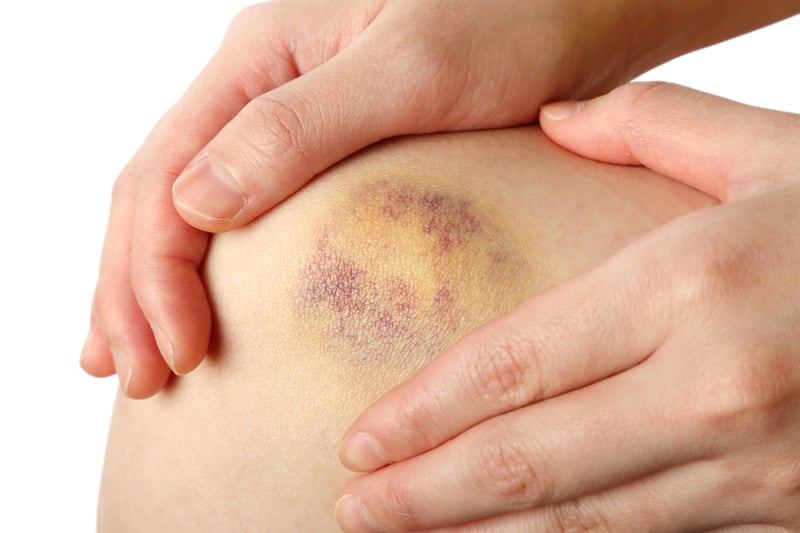Why Do I Bruise So Easily? 8 Possible Causes

You glance down at your body and notice a new, unsightly bruise on your hip, thigh, or arm, yet you have no idea where it came from. Did you bump into something? For a bruise like that, you must have, right? But wouldn’t you have felt it enough to remember it? If it happens rarely, you may not give it a second thought. After all, you have bigger things to worry about. But if it occurs more frequently, you may begin to wonder, “Why do I bruise so easily, and should I be concerned?”
What is a Bruise?
For the most part, bruising (medically referred to as a contusion) occurs when small blood vessels (also known as capillaries) near the surface of the skin are broken. This typically occurs when the soft tissue is damaged after an impact or injury to, most often, the arms or legs. The leaking of blood from the capillaries reveals itself on the outside of the body as a black and blue mark (which may turn various other colors, like purples, yellows, and browns, as it heals). Once the body has had the chance to heal and reabsorb the blood, the bruise disappears.
The harder the hit, typically, the larger and more colorful the bruise. But bruises can happen even after a minor, virtually unnoticeable bump for some people.
Why Do I Bruise?
Bruising is commonly caused by a minor injury (e.g., bumping into furniture, falling down, having something drop on your body, or during sporting activities).
Some folks bruise more easily than others. Some of the most common reasons people bruise more easily include:
1. Your Gender
That is, women tend to bruise more easily than men. This is because men tend to have thicker skin and more collagen. Estrogen, which women have in greater amounts, may also play a role in developing bruises.
2. Your Age
Older people tend to bruise more easily as the skin becomes thinner due to lower collagen levels and less protective fat. So, the blood vessels are closer to the surface and easier to injure.
3. Medications
Another common cause of increased or prolonged bruising can include certain medications, such as aspirin, NSAIDs (like ibuprofen), blood thinners, and anti-platelet agents. Drugs like corticosteroids have also been shown to thin the skin, making you more likely to bruise. 1 If these medications have been prescribed, talk with your doctor about your bruising, as well as about any supplements you may also be using, as an interaction between a medication and supplement may be at play.
4. Supplementation
Some supplements may increase bruising on rare occasions. For example, the herb Ginkgo biloba appears to have a blood-thinning effect that some suggest may lead to increased bruising. 2 However, more research is needed as some studies have found no real impact on bruising. 3 Other supplements that may thin the blood and make bruising more likely for some folks include garlic and fish oils.
5. Nutrient Deficiencies
On the other hand, nutrient deficiencies can also lead to increased bruising. Both vitamins C and K are needed for tissue repair and proper blood clotting. Iron deficiencies can also raise the risk. If you’re not getting enough of these nutrients, you could bruise more easily.
6. Intense Exercise
Another surprising cause of bruising can be intense exercise. If you push too hard and strain the muscle, it could cause injury, including a blood vessel burst, leading to a bruise.
7. Medical Conditions
Bruises typically aren’t a cause for concern. However, if you are developing large, frequent bruises with no valid reason, especially on the face, back, or torso; if your bruise is continuing to get larger; if you have experienced significant bleeding; if you have started bruising more often after beginning to use a new medication; if you have a family history of bleeding; or if your bruising is accompanied by other symptoms, please reach out to your physician. Increased bruising could be due to blood clotting problems, an underlying disease (e.g., diabetes, Von Willebrand disease, thrombophilia, etc.). Your doctor can check blood platelets, for time to clot, etc., to see if there may be an underlying issue.
8. Your Family
Bruising easily sometimes be genetic. So, if your mom, dad, or siblings also easily bruise, it may just be a family trait.
Can I Avoid Bruising?
The best way to avoid bruising is to prevent it in the first place. Since bruising tends to result from an impact or fall, that’s a good place to start. Safeguard your home to prevent falls by:
- Ensuring you have enough lighting in the house (so you can see clearly)
- Cleaning up clutter, so you’re less likely to trip, especially on or near stairs
- Watching throw rugs as they can sometimes bunch up and become tripping hazards
- Arranging furniture so it’s not in typical walkways (and move it if it is obstructing your usual paths)
- Ensuring cords are not left out in the open—keep them tucked safely away
Can I Help My Bruises Heal Faster?
Once a bruise has formed, it’s mostly a waiting game until the body has healed and reabsorbed the blood. Unfortunately, as we age, this can take longer. Still, no matter your age, most bruises begin to disappear somewhere between one and three weeks.
If the bruise is painful or causing discomfort, it can help to elevate the injury and apply ice. Ice may be most helpful when used immediately to help constrict blood vessels and reduce the leakage before the bruise has formed. Ice for 10 minutes, and then allow the bruise to rest for 20 minutes before icing again.
Heat and compression may also help increase blood circulation and flow to help remove trapped blood, relax tense muscles, and decrease pain. You can use a heating pad, a hot water bottle, or soak in a hot bath.
Nutrients that may help support healthy blood flow and circulation include vitamin C, polyphenols/flavonoids abundant in beets and fruits like apples, pomegranates, grapes, and berries. These nutrients help support healthy nitric oxide levels in the body.
Topical vitamin K and the herb arnica may also help speed healing. 4, 5 Aloe vera may help reduce pain and inflammation when applied topically.
If your bruising is related to an underlying condition, you may notice improvements as you follow your doctor’s instructions for treatment.
Again, please reach out to your doctor if:
- You still experience pain after three or four days, especially if the injury seemed minor
- If a lump has developed over the bruise
- If you notice increased bleeding (such as nose bleeds) or blood in the urine or stool
No matter what your age or gender, the occasional bruise is just part of an active lifestyle. As long as it isn’t too painful and isn’t accompanied by other symptoms, remember that the colorful decoration on your hip, thigh, or arm will soon disappear.





 7 Signs Your Body is Seriously Low on Collagen (not just wrinkles)
7 Signs Your Body is Seriously Low on Collagen (not just wrinkles) Health Expert: "Turmeric Doesn't Work (unless...)"
Health Expert: "Turmeric Doesn't Work (unless...)" 3 Warning Signs Your Probiotic Supplement is a Total Waste
3 Warning Signs Your Probiotic Supplement is a Total Waste

